(完整word)高中名词性从句讲解与练习
(完整版)名词性从句讲解及专项练习习题及其解答
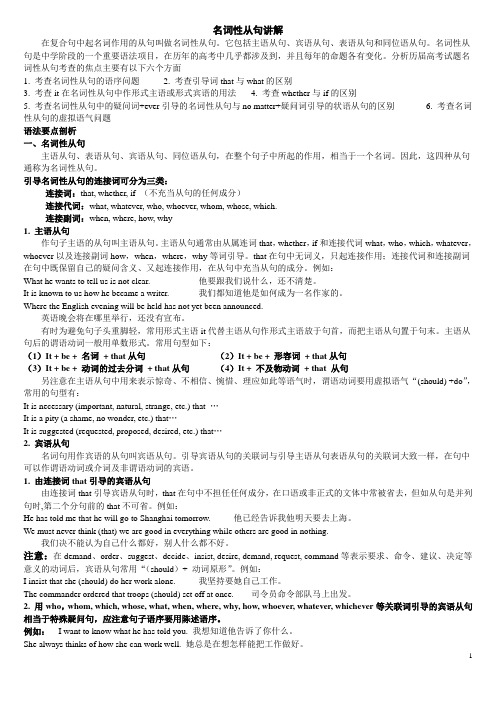
名词性从句讲解在复合句中起名词作用的从句叫做名词性从句。
它包括主语从句、宾语从句、表语从句和同位语从句。
名词性从句是中学阶段的一个重要语法项目,在历年的高考中几乎都涉及到,并且每年的命题各有变化。
分析历届高考试题名词性从句考查的焦点主要有以下六个方面1. 考查名词性从句的语序问题2. 考查引导词that与what的区别3. 考查it在名词性从句中作形式主语或形式宾语的用法4. 考查whether与if的区别5. 考查名词性从句中的疑问词+ever引导的名词性从句与no matter+疑问词引导的状语从句的区别6. 考查名词性从句的虚拟语气问题语法要点剖析一、名词性从句主语从句、表语从句、宾语从句、同位语从句,在整个句子中所起的作用,相当于一个名词。
因此,这四种从句通称为名词性从句。
引导名词性从句的连接词可分为三类:连接词:that, whether, if (不充当从句的任何成分)连接代词:what, whatever, who, whoever, whom, whose, which.连接副词:when, where, how, why1. 主语从句作句子主语的从句叫主语从句。
主语从句通常由从属连词that,whether,if和连接代词what,who,which,whatever,whoever以及连接副词how,when,where,why等词引导。
that在句中无词义,只起连接作用;连接代词和连接副词在句中既保留自己的疑问含义、又起连接作用,在从句中充当从句的成分。
例如:What he wants to tell us is not clear. 他要跟我们说什么,还不清楚。
It is known to us how he became a writer. 我们都知道他是如何成为一名作家的。
Where the English evening will be held has not yet been announced.英语晚会将在哪里举行,还没有宣布。
高中英语名词性从句知识讲解以及练习题 附答案
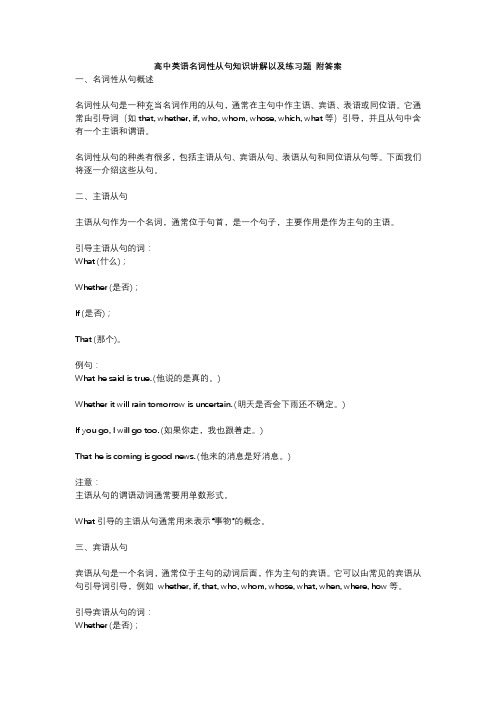
高中英语名词性从句知识讲解以及练习题附答案一、名词性从句概述名词性从句是一种充当名词作用的从句,通常在主句中作主语、宾语、表语或同位语。
它通常由引导词(如that, whether, if, who, whom, whose, which, what等)引导,并且从句中含有一个主语和谓语。
名词性从句的种类有很多,包括主语从句、宾语从句、表语从句和同位语从句等。
下面我们将逐一介绍这些从句。
二、主语从句主语从句作为一个名词,通常位于句首,是一个句子,主要作用是作为主句的主语。
引导主语从句的词:What (什么);Whether (是否);If (是否);That (那个)。
例句:What he said is true. (他说的是真的。
)Whether it will rain tomorrow is uncertain. (明天是否会下雨还不确定。
)If you go, I will go too. (如果你走,我也跟着走。
)That he is coming is good news. (他来的消息是好消息。
)注意:主语从句的谓语动词通常要用单数形式。
What引导的主语从句通常用来表示“事物”的概念。
三、宾语从句宾语从句是一个名词,通常位于主句的动词后面,作为主句的宾语。
它可以由常见的宾语从句引导词引导,例如whether, if, that, who, whom, whose, what, when, where, how等。
引导宾语从句的词:Whether (是否);If (是否);That (那个);Who (谁);Whom (谁);Whose (谁的);What (什么);When (何时);Where (何处);How (如何)。
例句:I know that he is coming. (我知道他要来。
)I wonder if he is telling the truth. (我想知道他是否说了真话。
高中英语语法名词性从句(附练习题)
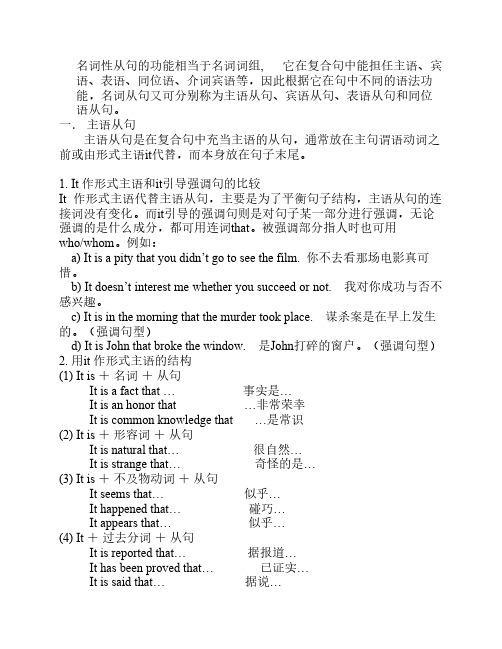
名词性从句的功能相当于名词词组, 它在复合句中能担任主语、宾语、表语、同位语、介词宾语等,因此根据它在句中不同的语法功能,名词从句又可分别称为主语从句、宾语从句、表语从句和同位语从句。
一.主语从句 主语从句是在复合句中充当主语的从句,通常放在主句谓语动词之前或由形式主语it代替,而本身放在句子末尾。
1. It 作形式主语和it引导强调句的比较It 作形式主语代替主语从句,主要是为了平衡句子结构,主语从句的连接词没有变化。
而it引导的强调句则是对句子某一部分进行强调,无论强调的是什么成分,都可用连词that。
被强调部分指人时也可用who/whom。
例如:a) It is a pity that you didn’t go to see the film. 你不去看那场电影真可惜。
b) It doesn’t interest me whether you succeed or not. 我对你成功与否不感兴趣。
c) It is in the morning that the murder took place. 谋杀案是在早上发生的。
(强调句型)d) It is John that broke the window. 是John打碎的窗户。
(强调句型)2. 用it 作形式主语的结构(1) It is +名词+从句It is a fact that … 事实是…It is an honor that …非常荣幸It is common knowledge that …是常识(2) It is +形容词+从句It is natural that… 很自然…It is strange that… 奇怪的是…(3) It is +不及物动词+从句It seems that… 似乎…It happened that… 碰巧…It appears that… 似乎…(4) It +过去分词+从句It is reported that… 据报道…It has been proved that… 已证实…It is said that… 据说…3. 主语从句不可位于句首的五种情况:(1)if 引导的主语从句不可居于复合句句首。
名词性从句讲解及专项练习习题及解答
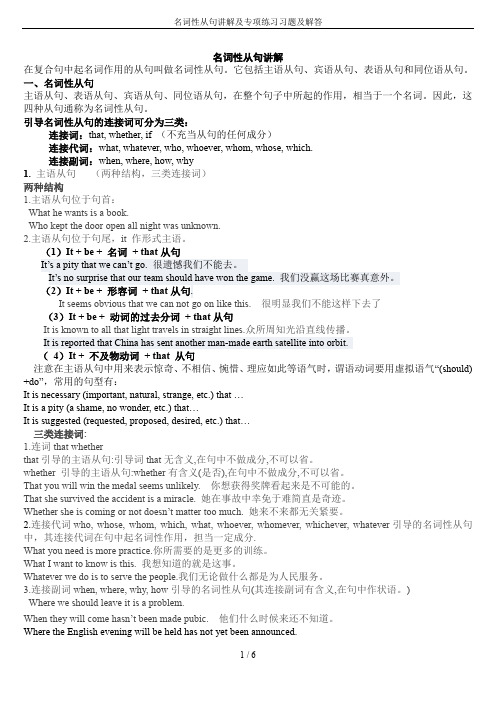
名词性从句讲解在复合句中起名词作用的从句叫做名词性从句。
它包括主语从句、宾语从句、表语从句和同位语从句。
一、名词性从句主语从句、表语从句、宾语从句、同位语从句,在整个句子中所起的作用,相当于一个名词。
因此,这四种从句通称为名词性从句。
引导名词性从句的连接词可分为三类:连接词:that, whether, if (不充当从句的任何成分)连接代词:what, whatever, who, whoever, whom, whose, which.连接副词:when, where, how, why1. 主语从句(两种结构,三类连接词)两种结构1.主语从句位于句首:What he wants is a book.Who kept the door open all night was unknown.2.主语从句位于句尾,it 作形式主语。
(1)It + be + 名词+ that从句It’s a pity that we can’t go. 很遗憾我们不能去。
It’s no surprise that our team should have wo n the game. 我们没赢这场比赛真意外。
(2)It + be + 形容词+ that从句.It seems obvious that we can not go on like this. 很明显我们不能这样下去了(3)It + be + 动词的过去分词+ that从句It is known to all that light travels in straight lines.众所周知光沿直线传播。
It is reported that China has sent another man-made earth satellite into orbit.(4)It + 不及物动词+ that 从句注意在主语从句中用来表示惊奇、不相信、惋惜、理应如此等语气时,谓语动词要用虚拟语气“(should) +do”,常用的句型有:It is necessary (important, natural, strange, etc.) that …It is a pity (a shame, no wonder, etc.) that…It is suggested (requested, proposed, desired, etc.) that…三类连接词:1.连词that whetherthat引导的主语从句:引导词that无含义,在句中不做成分,不可以省。
高中名词性从句详细讲解+例句

名词性从句I. !"#$%&一、定义名词性从句是在句子中起名词作用的句子。
它在复合句中能担任主语、宾语、表语、同位语,分别称为主语从句、宾语从句、表语从句和同位语从句。
二、分类&表语从句1) That is(系动词) a book.S + P 表语2) The fact is(系动词)that he has lied to usS + P 表语从句&宾语从句1) He said(vt) nothing at the meeting.S + P 宾语2) He said (vt) (that) he would help us without hesitation.S + P 宾语从句3) He is interested in (prep) what we want for breakfast.S + P 宾语从句&主语从句1) His mistakes made his teacher angry.主语+ P2) That he made so many mistakes made his teacher angry.主语从句P3)What he said made his teacher angry.主语从句P&同位语从句1) You can turn to my friend Tom for help.S + P 同位语2) The announcement that a new airport was to be built nearby made us excited.S 同位语从句+ P3) We heard the news that the war had broken out between America and Iraq.S + P 同位语从句三、引导词名称引导词在从句中担任成分连接词that, whether, if 不作成分连接代词what, whatever, who, whoever, whose, which, whichever 主语、宾语、表语、定语连接副词when, where, why, how, whenever, wherever, however 状语例如:a. He said that he would come.b. Whether he can pass the exam is not certain.c. He agrees with what I said.d. He agrees with what was said.e. I don’t know what present I should buy.f. That is where Tom used to live.g. That’s why he left.四、名词性从句语序名词性从句用陈述句语序。
(完整word版)高中英语名词性从句知识点及练习,推荐文档
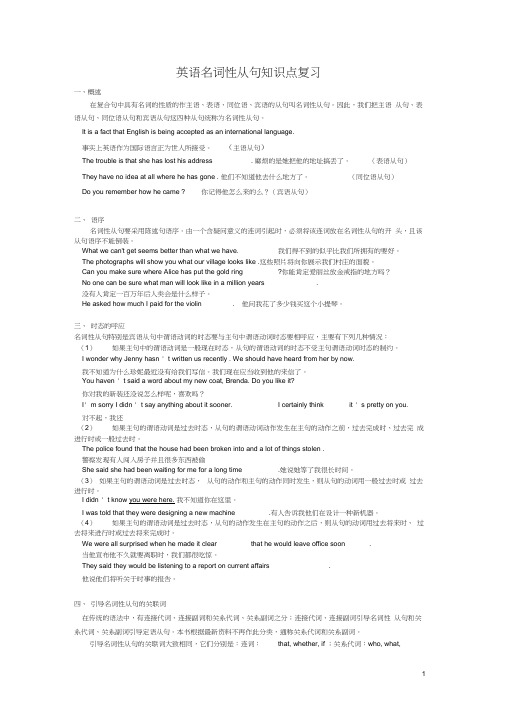
英语名词性从句知识点复习一、概述在复合句中具有名词的性质的作主语、表语、同位语、宾语的从句叫名词性从句。
因此,我们把主语从句、表语从句、同位语从句和宾语从句这四种从句统称为名词性从句。
It is a fact that English is being accepted as an international language.事实上英语作为国际语言正为世人所接受。
(主语从句)The trouble is that she has lost his address . 麻烦的是她把他的地址搞丢了。
(表语从句)They have no idea at all where he has gone . 他们不知道他去什么地方了。
(同位语从句)Do you remember how he came ? 你记得他怎么来的么?(宾语从句)二、语序名词性从句要采用陈述句语序。
由一个含疑问意义的连词引起时,必须将该连词放在名词性从句的开头,且该从句语序不能倒装。
What we can't get seems better than what we have. 我们得不到的似乎比我们所拥有的要好。
The photographs will show you what our village looks like .这些照片将向你展示我们村庄的面貌。
Can you make sure where Alice has put the gold ring ?你能肯定爱丽丝放金戒指的地方吗?No one can be sure what man will look like in a million years .没有人肯定一百万年后人类会是什么样子。
He asked how much I paid for the violin . 他问我花了多少钱买这个小提琴。
三、时态的呼应名词性从句特别是宾语从句中谓语动词的时态要与主句中谓语动词时态要相呼应,主要有下列几种情况:(1)如果主句中的谓语动词是一般现在时态,从句的谓语动词的时态不受主句谓语动词时态的制约。
高中名词性从句讲解与练习
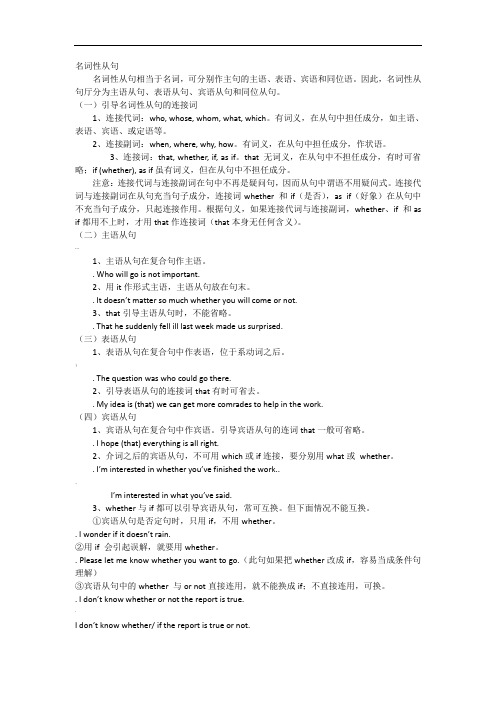
名词性从句名词性从句相当于名词,可分别作主句的主语、表语、宾语和同位语。
因此,名词性从句厅分为主语从句、表语从句、宾语从句和同位从句。
(一)引导名词性从句的连接词1、连接代词:who, whose, whom, what, which。
有词义,在从句中担任成分,如主语、表语、宾语、或定语等。
2、连接副词:when, where, why, how。
有词义,在从句中担任成分,作状语。
3、连接词:that, whether, if, as if。
that 无词义,在从句中不担任成分,有时可省略;if (whether), as if虽有词义,但在从句中不担任成分。
注意:连接代词与连接副词在句中不再是疑问句,因而从句中谓语不用疑问式。
连接代词与连接副词在从句充当句子成分,连接词whether 和if(是否),as if(好象)在从句中不充当句子成分,只起连接作用。
根据句义,如果连接代词与连接副词,whether、if 和as if都用不上时,才用that作连接词(that本身无任何含义)。
(二)主语从句…1、主语从句在复合句作主语。
. Who will go is not important.2、用it作形式主语,主语从句放在句末。
. It doesn’t matter so much whether you will come or not.3、that引导主语从句时,不能省略。
. That he suddenly fell ill last week made us surprised.(三)表语从句1、表语从句在复合句中作表语,位于系动词之后。
). The question was who could go there.2、引导表语从句的连接词that有时可省去。
. My idea is (that) we can get more comrades to help in the work.(四)宾语从句1、宾语从句在复合句中作宾语。
高中英语名词性从句讲解与练习
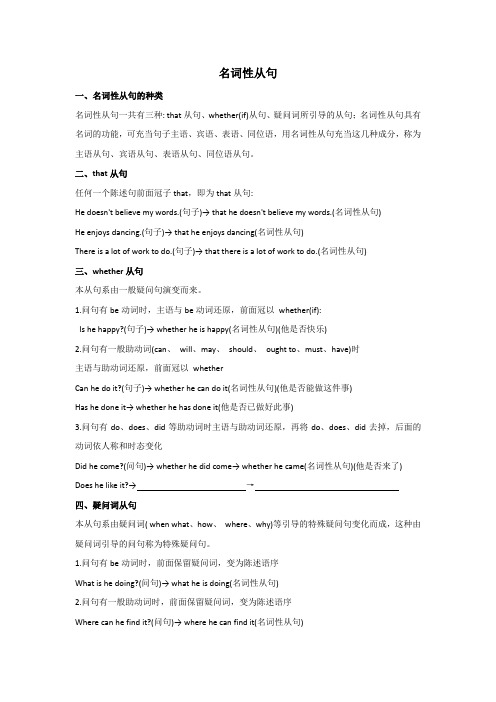
名词性从句一、名词性从句的种类名词性从句一共有三种: that从句、whether(if)从句、疑问词所引导的从句;名词性从句具有名词的功能,可充当句子主语、宾语、表语、同位语,用名词性从句充当这几种成分,称为主语从句、宾语从句、表语从句、同位语从句。
二、that从句任何一个陈述句前面冠子that,即为that从句:He doesn't believe my words.(句子)→ that he doesn't believe my words.(名词性从句)He enjoys dancing.(句子)→ that he enjoys dancing(名词性从句)There is a lot of work to do.(句子)→ that there is a lot of work to do.(名词性从句)三、whether从句本从句系由一般疑问句演变而来。
1.问句有be动词时,主语与be动词还原,前面冠以whether(if):Is he happy?(句子)→ whether he is happy(名词性从句)(他是否快乐)2.问句有一般助动词(can、will、may、should、ought to、must、have)时主语与助动词还原,前面冠以whetherCan he do it?(句子)→ whether he can do it(名词性从句)(他是否能做这件事)Has he done it→ whether he has done it(他是否已做好此事)3.问句有do、does、did等助动词时主语与助动词还原,再将do、does、did去掉,后面的动词依人称和时态变化Did he come?(问句)→ whether he did come→ whether he came(名词性从句)(他是否来了) Does he like it?→→四、疑问词从句本从句系由疑问词( when what、how、where、why)等引导的特殊疑问句变化而成,这种由疑问词引导的问句称为特殊疑问句。
- 1、下载文档前请自行甄别文档内容的完整性,平台不提供额外的编辑、内容补充、找答案等附加服务。
- 2、"仅部分预览"的文档,不可在线预览部分如存在完整性等问题,可反馈申请退款(可完整预览的文档不适用该条件!)。
- 3、如文档侵犯您的权益,请联系客服反馈,我们会尽快为您处理(人工客服工作时间:9:00-18:30)。
名词性从句名词性从句相当于名词,可分别作主句的主语、表语、宾语和同位语。
因此,名词性从句厅分为主语从句、表语从句、宾语从句和同位从句。
(一)引导名词性从句的连接词1、连接代词:who, whose, whom, what, which。
有词义,在从句中担任成分,如主语、表语、宾语、或定语等。
2、连接副词:when, where, why, how。
有词义,在从句中担任成分,作状语。
3、连接词:that, whether, if, as if。
that 无词义,在从句中不担任成分,有时可省略;if (whether), as if虽有词义,但在从句中不担任成分。
注意:连接代词与连接副词在句中不再是疑问句,因而从句中谓语不用疑问式。
连接代词与连接副词在从句充当句子成分,连接词whether 和if(是否),as if(好象)在从句中不充当句子成分,只起连接作用。
根据句义,如果连接代词与连接副词,whether、if 和as if 都用不上时,才用that作连接词(that本身无任何含义)。
(二)主语从句1、主语从句在复合句作主语。
e.g. Who will go is not important.2、用it作形式主语,主语从句放在句末。
e.g. It doesn’t matter so much whether you will come or not.3、that引导主语从句时,不能省略。
e.g. That he suddenly fell ill last week made us surprised.(三)表语从句1、表语从句在复合句中作表语,位于系动词之后。
e.g. The question was who could go there.2、引导表语从句的连接词that有时可省去。
e.g. My idea is (that) we can get more comrades to help in the work.(四)宾语从句1、宾语从句在复合句中作宾语。
引导宾语从句的连词that一般可省略。
e.g. I hope (that) everything is all right.2、介词之后的宾语从句,不可用which或if连接,要分别用what或whether。
e.g. I’m interested in whether you’ve finished the work..I’m interested in what you’ve said.3、whether与if都可以引导宾语从句,常可互换。
但下面情况不能互换。
①宾语从句是否定句时,只用if,不用whether。
e.g. I wonder if it doesn’t rain.②用if 会引起误解,就要用whether。
e.g. Please let me know whether you want to go.(此句如果把whether改成if,容易当成条件句理解)③宾语从句中的whether 与or not直接连用,就不能换成if;不直接连用,可换。
e.g. I don’t know whether or not the report is true.I don’t know whether/ if the report is true or not.④介词后的宾语从句要用whether引导。
whether 可与不定式连用。
whether也可引导主语从句、表语从句、同位语从句,还可引导让步状语从句,以上均不能换成if。
但引导条件从句时,只能用if,而不能用whether。
e.g. It depends on whether we have enough time.They don’t know whether to go there.Please come to see me if you have time.(五)同位语从句同位语从句在句中作某一名词的同位语,一般位于该名词(如:news, fact, idea, suggestion, promise等)之后,说明该名词的具体内容。
e.g. I have no idea when he will be back.The fact that he had not said anything surprised everybody.练习:名词性从句一、判断下列各句哪句含有名词性从句,并指出是什么从句:1. China is no longer what it used to be.2. The truth that the earth turn around the sun is known to all.3. It was snowing when he arrived at the station.4. How he persuaded the manager to change the plan is interesting to us all.5. The news that they had won the game soon spread over the whole school.6. The news that you told me yesterday was really disappointing.7. That is where Lu Xun used to live.8. He spoke as if he understood what he was talking about.9. Do you remember the teacher who taught us English at middle school?10. I wonder why she refused my invitation.二、用适当的连词填空:1. I can’t decide ____________ dictionary I should buy.2. That’s ____________ he refused my invitation.3. I am very interested in ____________ he has improved his pronunciation in such a short time.4. ____________ we need is more time.5. The fact ____________ she had not said anything at the meeting surprised everybody.6. ____________ and ____________ they will meet has not been decided yet.7. Please tell me ____________ you are waiting for.8. Is that ____________ you are looking for?9. Would you please tell me ____________ the nearest post office is?10. I don’t know ____________ he will agree to the plan or not.三、选择填空:1. Do you see _____ I mean?A. thatB./C. howD. what2. Tell me_____ is on your mind.A. thatB. whatC. whichD. why3. We must stick to _____ we have agreed on.A. whatB. thatC. /D. how4. Let me see _____.A. that can I repair the radioB. whether -I can repair the radioC. I can repair the radioD. whether can I repair the radio5. Keep in mind _____.A. that the teacher saidB. what did the teacher sayC. that did the teacher sayD. what the teacher said6. Could you advise me _____?A. which book should I read firstB. what book should I read firstC. that book 1 should read firstD. which book I should read first7. He was criticized for _____.A. he had done itB. what he had doneC. what had he doneD. that he had done it8. Would you kindly tell me _____?A. how can I get to the Beijing Railway StationB. how I can get to the Beijing Railway StationC. where can I get to the Beijing Railway StationD. whether can I get to the Beijing Railway Station9. Mrs. Smith was very much impressed by _____.A. what had she seen in ChinaB. that she had seen in ChinaC. what she had seen in ChinaD. which had she seen in China10. We took it for granted ___A. that they were not comingB. that were they not comingC. they were coming notD. were they not coining11. I really don't know _____A. I should do nextB. what should I do nextC. what I should do nextD. how I should do next12. I'm afraid _____.A. the little girl will have to be operated onB. that will the little girl have to operate onC. the little girl will have to operate onD. that will the little girl have to be operated on13. She walked up to _____ .A. where did I standB. where I stoodC. I stood thereD. where I stood there14. Can you tell me _____?A. who is that gentlemanB. that gentleman is whoC. who that gentleman isD. whom .is that gentleman15. We'll give you _____.A. that do you needB. what do you needC. whatever you needD. whether do you need16. They want us to know _____ to help us.A. what can theyB. what they canC. how they canD. how can they17. We must put _____ into practice.A. what we have learnedB. that we have learnedC. that have we learnedD. what have we learned18. Did she say anything about _____?A. that the work was to be doneB. how was the work to be doneC. that was the work to be doneD. how the work was to be done19. He was never satisfied with _____.A. what she had achievedB. had what she achievedC. she had achievedD. that she achieved20. These photographs will show you _____.A. what does our village look likeB. what our village looks likeC. how does our village look likeD. how our village looks like21. Peter insisted _____ he pay the bill.A. on thatB. whatC. thatD. on which22. They urged _____ the library open during the vacation.A. whenB. whereC. whyD. that23. We wish we could have learned _____ when we were at high school.A. what you didB. that you had doneC. that what you didD. what did you do24.1 will describe to you _____ I saw when there.A. whatB. thatC. whichD./25. From _____ I should say he is a good worker.A. what 1 know of himB. that I do know of himC. what do I know of himD. that do I know of him26. I will give this dictionary to __ wants to have it.A. whomeverB. anyoneC. whoeverD. someone27._____ they will come here hasn' t been decided yet.A. WhatB. ThatC. WhenD. Where28. _____ was said here must be kept secret.A. WhoB. The thingC. WhateverD. Where29. It is still a question _____ we shall have our sports meet.A. ifB. thatC. whatD. when30. I'm going anyway. _____ she will go is up to her to decide.A. If or notB. Whether or notC. IfD. That31. It is strange _____ she have left without saying a word.A. thatB. whatC. whyD. how32. It is very clear _____ our policy is a correct one.A. whatB. thatC. whyD. where33. _____ Mr Zhang said is quite right.A. ThatB. WhenC. WhatD. Whether34. It has been decided _____ he will be sent there.A. ifB. whetherC. whyD. that35. It doesn' t matter _____he' s come back or not.A. ifB. whetherC. thatD. when36. I t's a great pity _____ we won’t be able to finish the task on time.A. whenB. thatC. whyD. where37. It happened _____ I wasn't there that day.A. whenB. whyC. whereD. that38._____ you have done might do harm to other people.A. WhatB. ThatC. WhichD. The things39. _____ leaves the room last ought to turn oft the lights.A. AnyoneB. The personC. WhoeverD.Who40._____ the 2000 Olympic Games won't be held in Beijing is known to all.A. WhetherB. IfC. WheneverD. That41. _____ fails to see this will make a big mistake.A. ThatB. WhoeverC. WhetherD. Whether or not42. __ we need more equipment is quite obvious.A. WhatB. WhetherC. ThatD. Whatever43. Has it been announced _____?A. when are the planes to take offB. that are the planes to take offC. where are the planes to take offD. when the planes are to take off44. That is _____ we all support his idea.A. whatB. whyC. whereD. when45. That’s _____ we should do.A. thatB. whatC. howD. why46. _____ is troubling me is _____ I don’t understand _____ he saidA. What; that; whatB. What; what; whatC. That; that; whatD. Why; that; which47. Things were not _____ they seemed to be.A. whenB. whyC. thatD. what48. That’s _____ I want to say.A. all whatB. whatC. all whichD. what that49. That’s _____ .A. where our differences lieB. our differences lie thereC. where do our differences lieD. that where our differences lie50. That is _____ .A. where lived he thereB. where did he liveC. where he livedD. that where he lived51. The questions is _____.A. whether is it worth doingB. that if it is worth doingC. whether it is worth doingD. if it is worth doing52. Water will continue to be _____ it is today next in importance to oxygen.A. howB. whichC. whatD. as53. That's_____.A. how did I become a teacherB. how I became a teacherC. how a teacher I becameD. that I became a teacher54. They are just _____.A. that what shall I haveB. what shall I haveC. that I shall have whatD. what I shall have55. It looked ____.A. as if it was going to rainB. that as if it was going to rainC. as if was it going to rainD. as if that it was going to rain56. That's_____.A. how she did itB. that how did she do it.C. how did she do itD. what she did it57. That is _____ we decided to put the discussion off.A. whereB. whichC. thatD. why58. That’s _____ I lived when I was ten years old.A. whereB. at whichC. there whereD. when59. My suggestion is _____ we should send a few comrades to help them.A. ifB. thatC. when thatD. that where60. The idea _____ all people are selfish is wrong.A. whatB. thatC. whyD. if61. We heard the news _____ our team had won.A. thatB. whatC. whetherD. why62. The fact _____ he hadn’t said anything surprised us all.A. whyB. ifC. thatD. whether63.I have no idea _____ she will be back.A. thatB. whereC. that whenD. when64. We must keep in mind the fact _____ China is still a developing country.A. whetherB. thatC. whyD. when65. They have no idea at all _____.A. where he has goneB. where did he goC. where has he goneD. which place he has gone参考答案语法复习五:名词性从句一、1、表语从句;2、同位语从句;3、不是;4、主语从句;5、同位语从句;6、不是;7、表语从句;8、宾语从句;9、不是;10、宾语从句二、1. which; 2. why; 3. how; 4. What; 5. that; 6. when, where; 7. who(m); 8. what; 9. where; 10. whether三、1~5 DBABD 6~10 DBBCA 11~15 CABCC 16~20 BADAB 21~25 CDAAA26~30 CCCDB 31~35 ABCDB 36~40 BDACD 41~45 BCDBB 46~50 ADBAC51~55 CCBDA 56~60 ADABB 61~65 ACDBA。
